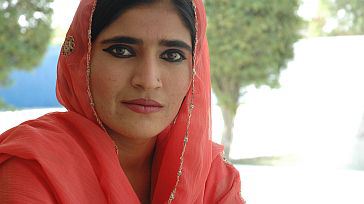Asma Ahmad Sheikh has helped people in rural Pakistan get training and set up their own businesses. Her work as a Changemaker led to her winning in a global skills competition.
THATTA, Pakistan (ILO) – Asma Ahmad Sheikh was 17 years old when she dropped out of school. Doing housework and looking after cattle were what her parents wanted from her.
However, Ms Ahmad Sheikh wanted something more.
Two years later, she heard about a business and technical training course and begged her parents to let her take part. Empowerment through Creative Integration (ECI), the non-governmental organization that organized the training, helped her persuade her family, assuring them that she would be safe.
“My family wasn’t keen. They didn’t think women should be running businesses; that was a man’s job,” she said.
Ms Ahmad Sheikh lives in Thatta, one of the most underdeveloped districts in Pakistan, and within Thatta, her village is one of the poorest, with little education and few basic amenities such as safe drinking water and sewerage.
Most of the villagers, including her own family, depend on raising cattle and farm labour for their living.
Faced with her determination her parents caved in. Ms Ahmad Sheikh got herself registered.
The programme was called Change makers: business solutions to social problems. Change makers identify demand for a product or service and mobilise people, especially women, to get the right vocational and enterprise development training to meet that demand.
Ms Ahmad Sheikh trains other women in her village to stitch©ILO
Ms Ahmad Sheikh was trained in stitching and enterprise development, including social mobilisation and value-chain analysis. She has used these skills to set up her own stitching business centre, which acts as a hub through which villagers get orders from business people for tailoring and handicrafts.
This has eliminated the role of middlemen and helped them get orders for tailoring and embroidery crafts directly from the markets in Karachi and other major cities.
Ms Ahmad Sheikh not only runs her own stitching business centre, but also a community business centre where she has helped more than 30 other women and men get training and set up their own businesses in stitching, cosmetics, electrical work, livestock management and waste recycling.
“That means that 30 families now have more money that they can spend on sending their children to school, buying them uniforms and school books, going to the doctor and buying medicines,” she said.
“So, through my persuasion and imparting knowledge and skills to other girls and families, I have succeeded in improving the situation of sanitation and livelihoods in my community. When families’ situation improves the community’s situation improves too”.
She has also mentored others who want to set up their own businesses, showing them what opportunities exist and teaching them business skills such as costing, pricing and marketing.

Ms Ahmad Sheikh helps women and men in Pakistan set up their businesses ©ILO
“People have seen my success and they have seen that working doesn’t bring any harm to women, it instead gives them money and respect and confidence, they have trusted me to guide their daughters too,” she said.
“If you look around, in the last three years, many mud houses have turned into proper houses made with baked bricks. The village looks cleaner and more prosperous.”
Her work led to Ms Ahmad Sheikh winning second prize in the global “Skills in Action Awards 2014”, organized by United Nations Educational, Scientific and Cultural Organization (UNESCO) and International Centre for Technical and Vocational Education and Training (UNEVOC).
“I’ve been trained as a Changemaker: I don’t wait for change to happen. I make it happen,” she said.











